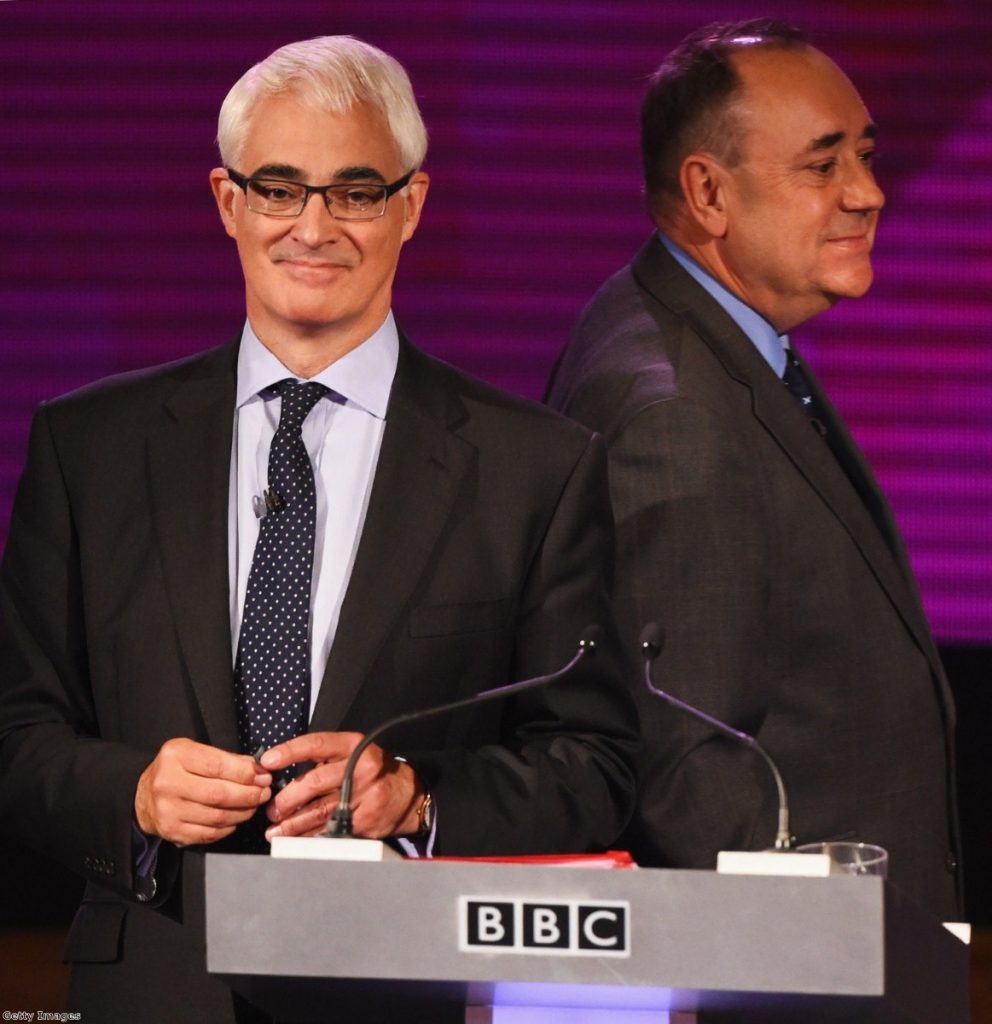Shoddy debate shows Darling is a one-trick pony
Last night's debate on Scottish independence was an unedifying spectacle. For whole sections Alistair Darling and Alex Salmond were allowed to talk over one another, in a spiteful exchange during which little could be understood, let alone contemplated.
It was a failure of chairmanship, with the hands-off approach deployed by presenter Glenn Campbell leading to a frustrating debate in which neither man was really able to express himself properly. The section in which the men could question one another was basically a write-off. You could barely make out a word. They might as well have filmed two men in the back of a pub.
More concerningly for Better Together, it was also a failure of the Darling approach to the campaign. The unionist case was made with the same qualities which Darling represents: workmanlike point-scoring and cautious warnings of uncertainty.
Darling is very accomplished at asking difficult questions about what will happen in the future, such as currency and oil revenue. He did this with aplomb in the last debate. This time Salmond was ready for him – not with a coherent answer, but the not-unreasonable observation that this felt like warmed-up left-overs.


What Darling cannot do is make an emotional case for the union. He could not speak with any passion or imagination about the island identity of Britain, about our shared qualities, because it clearly does not represent the way he thinks.
He was every inch the former chancellor, zealously guarding the nation's pocket money. But he could not express how Britain is an extraordinary experiment in multiculturalism, or that the peoples of this island have more which unites than divides them. He could not make the case against borders. And crucially he could not convincingly make the case for a social democrat country, given that his own time in government was beset by the free market dogma which has poisoned Labour and Tory administrations since Thatcher. You could feel the chickens coming home to roost for over a decade of Labour betrayals in government.
Of course, it is insane for Scots to vote for independence on the basis of the current coalition government in Westminster or even the Labour government which preceeded it. It is not that much less silly to vote for it on the basis of oil revenue, which is short-term and volatile whichever way you look at it. But finally last night we saw the much-discussed attraction of a positive versus a negative argument. Darling was the establishment. Salmond at least had something different to offer, a break from the neo-liberalism of the past. His use of the NHS is, of course, a brazen scare tactic. But the fact it is usable at all is an indictment of privatisation under the Tories and Labour.
Salmond's commitment to leftist politics does not survive even the most cursory scrutiny. Scratch the surface and you see slashed corporation tax rates, intimate working relationships with right-wing US moguls, and a confused economic vision which does not distinguish between the generous Nordic model and the low-tax obsession of Ireland. But he is at least able to speak outside of the neo-liberal Westminster consensus which so unsettles the people of Scotland – and many in Wales and England. Darling quite plainly is not.
Will it rob Better Together of a victory? Almost certainly not. There will be a poll upset, but probably they will return to where they are now before the day of the vote. But the debate may remove the sheen from a 'No' victory and give the impression that the union is an unloved compromise, set to continue for another generation.
That would be tragic. The Scottish independence referendum is not just a fight against nationalism. It is a fight for an open, multicultural, outward-looking Britain, with a mutually-compatible tribal and and island identity; one which is at home with its differences and its similarities. To win on the basis of caution would be no victory at all.












